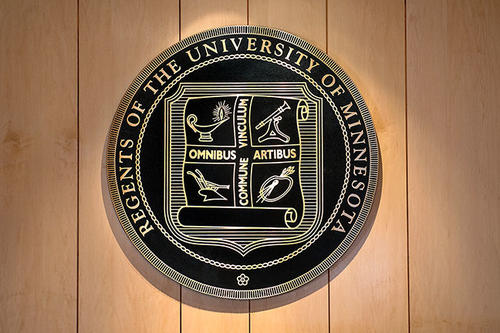Several key changes to University of Minnesota misconduct policies likely following Board of Regents discussion

The University of Minnesota is among many public universities nationwide reviewing its sexual misconduct policies and implementing necessary changes to bring these policies into compliance with new federal Title IX regulations by August 14. During its Wednesday meeting, the Board of Regents discussed what specific University policies and processes may need to change in light of these new regulations.
“As a University, we are committed to prioritizing the health of our campus communities. This priority has been clear in our discussions of major issues affecting the University in recent months and continues to be true in this critically important conversation about Title IX and sexual misconduct,” said Board Chair Ken Powell. “As we deliberate changes to policies and employment rules, we do so with the wellbeing of every student, faculty and staff member in mind. We will follow new federal regulations in this area, and in a manner that allows our University community to feel safe, respected, and free from any form of sexual misconduct.”
The Board discussed changes to processes for investigating and adjudicating sexual misconduct cases across the University’s five-campus system, including the standard of evidence used in these cases, the role of advisors, the composition of hearing panels and how decisions are appealed.
Among the recommendations the Board reviewed for future action:
- Instituting a single, systemwide grievance process for all University members. Currently, the University applies different grievance procedures in sexual misconduct cases based on who is responding to the complaint (student, staff members in various job classifications, tenured or non-tenured faculty, etc.). Creating a systemwide process for all University members will ensure compliance with federal guidance and consistency in the application of University policy.
- Creating a systemwide hearing committee made up of trained faculty, staff and students from all five University campuses to serve as decision-makers in hearings. This recommended committee would include three members for each hearing - a professional hearing officer and one panelist selected by each party from a list of available hearing committee members.
- Allowing full advisor participation in hearings, though exact implementation of this regulation will require some additional consideration as the Board weighs a recommendation that the University provide trained individuals to serve as advisors for those who need this support during the hearing process.
- Updating the appeal processes for both complainants and respondents in all matters. Grounds for such an appeal may include procedural irregularities, new evidence, conflict of interests/biases, or unreasonable decisions of responsibility or discipline.
- Applying the preponderance of the evidence standard in all sexual misconduct matters involving students, staff and faculty. Currently, the Tenure Code applies the clear and convincing evidence standard, setting it apart from the standard used in matters involving non-faculty respondents. New regulations require the University to have a single standard of evidence across all hearings.
- Defining sexual exploitation and adding it as a type of sexual harassment under University policy.
“The safety and care of our students and University community is our top priority,” said University President Joan Gabel. “This commitment leads our work and advocacy as we engage in broad consultation across the University to best revise our policies, procedures, and practices to comply with the new U.S. Department of Education regulations.”
Board action is required to amend two Board of Regents policies affected by the recommended changes. The Board will also need to approve changes to employment rules and ratify several administrative policy changes. Those actions are expected at an upcoming meeting.
The Board also:
- Approved a one-time employee retirement incentive offer program recommended by President Gabel among cost-saving measures for the fiscal year, which began July 1.
- Heard the annual report of the University of Minnesota Alumni Association (UMAA), during which the organization shared how it is continuing to engage the nearly 500,000 living alumni of the Twin Cities and Rochester campuses.
- Approved real estate transactions, including the purchase of 501 Oak Street SE in Minneapolis and the sale of 1.66 acres at UMore Park in Rosemount.
- Conferred tenure for five outside appointments on the Twin Cities campus.
The Board of Regents is scheduled to meet next on Sept. 10-11, 2020. Visit regents.umn.edu for more information.
- Categories:
- Campus Affairs





